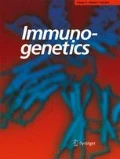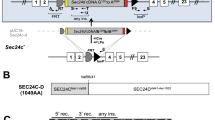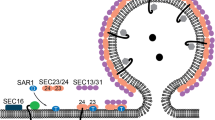Abstract
A cDNA encoding a new secretory form of mouse membrane cofactor protein (MCP, CD46) was identified additionally to the membrane form cDNA. The secretory MCP, predicted from the cDNA sequence, consisted of the conserved four short consensus repeats (SCRs) plus a four amino acid-stretch. Unlike human MCP which comprises many isoforms, mouse MCP cDNA predicted a single isoform of membrane MCP with cytoplasmic tail 1 (CYT1) and serine/threonine-rich domain C (STC). To clarify the genomic origin and monomorphic alteration of these cDNAs, we cloned and analyzed a mouse genomic DNA harboring the full coding sequence of MCP from a 129/SV mouse genomic library. The mouse Mcp was a single gene ∼50 kilobases long. Eleven of the 14 coding exons of the human MCP gene and intron-exon boundary sequences were found to be conserved in the mouse gene. The STC homologue but not the STA or STB homologue in the mouse exons was functional: the latter being due to deletions and lack of consensus sequences for splicing. The sequence equivalent to cytoplasmic tail 2 (CYT2) has not been identified in the Mcp genome. Thus, the three exons (STA, STB, and probably CYT2) responsible for the polymorphism of human MCP by differential splicing were missing in the mouse Mcp gene. Unlike the case in humans, no Mcp-related genes or pseudogenes were observed in the mouse genome. The single mouse Mcp gene was mapped to the R-positive H5 band of mouse Chromosome 1 by FISH. Strikingly, one alternative exon with 73 base pairs (encoding the four new amino acids and a TGA stop codon) was discovered between the SCRIV and the STC exons; alternative splicing causes the generation of the secretory form of mouse MCP. These results on mouse MCP, together with the information concerning other mouse SCR proteins, infer that the regulator of complement activation (RCA) gene cluster is genetically diverged between humans and mice.
Similar content being viewed by others
Author information
Authors and Affiliations
Additional information
Received: 22 April 1999 / Revised: 21 June 1999
Rights and permissions
About this article
Cite this article
Nomura, M., Tsujimura, A., Shida, K. et al. Membrane and secretory forms of mouse membrane cofactor protein (CD46) generated from a single gene through alternative splicing. Immunogenetics 50, 245–254 (1999). https://doi.org/10.1007/s002510050600
Issue Date:
DOI: https://doi.org/10.1007/s002510050600




